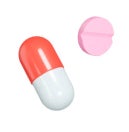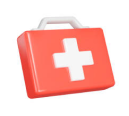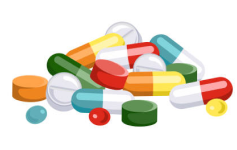Uses
What is Cyclophosphamide (Non-cancer) for?
Cyclophosphamide belongs to a class of medications called immunosuppressants. It reduces the body's immune response by stopping or slowing the growth of immune cells. It helps to reduce inflammation, improve symptoms, reduce flares and stops disease from getting worse.
How should I take or use Cyclophosphamide (Non-cancer)?
-
It may be given by
- Intravenous infusion (inject into the blood vessel). This has to be done in the hospital for typically a few hours.
-
Orally (by mouth)
- Take the tablets with or after food to reduce stomach upset. It can cause nausea and vomiting at the start of therapy, but if the dose is increased slowly, your body will usually get used to it.
- Do not take the tablets at bedtime to minimize the risk of irritation to the bladder when urine accumulates overnight.
- The tablets should be swallowed whole, with a glass of water. The tablets should not be crushed or chewed.
- Dosage and duration of cyclophosphamide will depend on your body weight, disease activity and response to the medication.
- This medication does not work immediately. It may take between 6 to 12 weeks before you notice any benefit. Thus, it is important that you take your medication or come back for infusion regularly, otherwise the benefits will not be seen.
- Do not stop your medication without checking with your healthcare professional.
- Other medications such as corticosteroids (e.g. prednisolone) or disease modifying anti-rheumatic drugs (DMARDs) may be taken with cyclophosphamide.
What should I do if I forget to take or use Cyclophosphamide (Non-cancer)?
If you miss a dose, take the missed dose as soon as you remember. If it is almost time for your next dose, skip the missed dose and continue with your regular dose. Do not take double doses to make up for the missed dose.
If you miss your infusion appointment, book another appointment as soon as possible. Inform your doctor about the missed/ late dose.
Precaution
What precautions should I take when taking or using Cyclophosphamide (Non-cancer)?
Inform your healthcare professional if:
- You are allergic to this medication or any of the other ingredients of this medication.
- You are taking any other medications, including over-the-counter medications, supplements, traditional medications and herbal remedies.
- You are pregnant, planning to become pregnant, or are breastfeeding.
- Both men and women of childbearing age should** **use a reliable method of contraception to avoid an unplanned pregnancy during and 6 to 12 months after stopping or completing cyclophosphamide.
- If you are planning to have a child, discuss it with your doctor before you begin the treatment.
- Do not breastfeed while you take this medication and for at least 6 weeks after the last dose of cyclophosphamide.
Avoid overcrowded places and stay away from people who are sick to prevent getting an infection.
Reactivation of infections such as tuberculosis (TB) and hepatitis B may happen when you are on medication, hence, your doctor will check for such infection before starting cyclophosphamide.
What food or medication should I avoid when I take or use Cyclophosphamide (Non-cancer)?
- Avoid eating raw, undercooked or half-cooked food.
- Pneumococcal, influenza (flu) and Hepatitis B vaccinations are safe and may be given if required. Avoid live vaccines such as MMR (measles, mumps and rubella), OPV (oral polio vaccine), yellow fever or BCG (tuberculosis). Discuss with your doctor before receiving any vaccines. Also, direct contact with persons who have taken oral polio vaccine or those with infections should be avoided.
Side Effects
What are some common side effects of Cyclophosphamide (Non-cancer)?
-
Decreased appetite, nausea, vomiting
- If you are on infusion: Medication may be given before the infusion to prevent these side effects.
- If you are on oral medication: Take medication after food to minimise the side effects. Sucking hard, sugar-free candy may reduce nausea and vomiting.
-
Infusion reactions: symptoms include flushing, headache
- Medications may be given to manage these side effects.
-
Bladder pain
- Drink plenty of water (at least 2 litres per day, unless instructed otherwise by the doctor) to pass urine frequently after receiving the infusion
-
Infection: symptoms include colds, inflammation of the sinuses/nose, urinary tract infections and skin
infections
- If you develop a fever, sore throat or feel generally unwell, see a doctor immediately. The doctor whom you consult should be told that you are on cyclophosphamide.
-
Hair Thinning
- This is harmless and may not be obvious. It often resolves by itself, though the new hair may have a different color or texture
- Low blood cell count (platelet, red and/or white blood cell)
- Diarrhea
- Dizziness
- Skin rash
- Changes in the colour of the skin and nails
- No/ irregular menses for child-bearing age women
It is important to monitor the effects of your treatment. For your safety, you need to do regular blood tests for monitoring by your doctor.
What are some rare but serious side effects that I need to seek medical advice immediately?
The symptoms of a drug allergy include one or more of the following:
- Swollen face/eyes/lips/tongue
- Difficulty in breathing
- Itchy skin rashes over your whole body
Some rare but serious side effects include:
- Combined low blood cell count (symptoms include infection, feeling very tired or weak, bleeding)
- Liver injury (symptoms include yellowing of eye whites or skin, dark or tea-coloured urine or constant abdominal pain)
- Hemorrhagic cystitis, a condition where the breakdown substance of cyclophosphamide irritates the bladder (symptoms include blood in the urine, bladder pain)
If you experience any of these symptoms, you should stop your medication and see your healthcare professional immediately.
Cyclophosphamide may also cause:
- Severe infections such as fungal infections, reactivation of tuberculosis and hepatitis B
- Decreased fertility in both men and women using the medication
- Birth defects and miscarriage in women using the medication
- Increased risk of certain cancers such as bladder cancer. You may have a higher risk if you are also taking certain medications that suppress the immune system. Your doctor will monitor you closely for any signs of cancer.
Handling
How should I store Cyclophosphamide (Non-cancer)?
Store in a cool and dry place, away from direct sunlight. Keep this medication away from children.
How do I throw away Cyclophosphamide (Non-cancer) safely?
Pack the medication into a bag and bring it back to the pharmacy where you received the medication from.
Last updated on Oct 2022

Need More Medicine?
Use Medicine Order Service on HealthBuddy.

Medicines Reminder
Get reminders and chart progress on HealthBuddy.

















